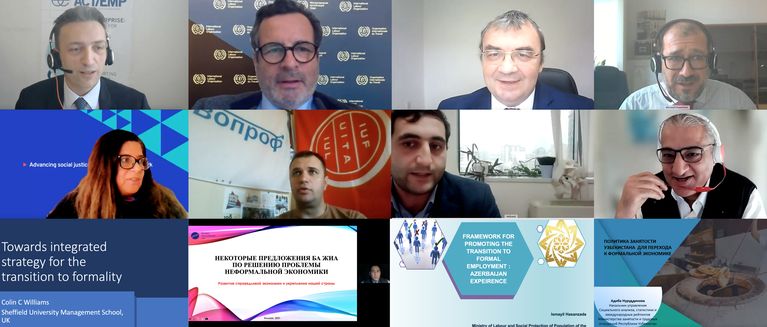CIS countries shared progress on transition to formality during the inter-regional dialogue with the BRICS
On 16 November 2021, representatives of the tripartite constituents from Azerbaijan, Kyrgyzstan, the Russian Federation and Uzbekistan discussed the progress on transitioning to the formal economy with their BRICS counterparts during the BRICS-CIS knowledge exchange series on formalisation, jointly organized by the International Labour Organization (ILO) and the International Training Center in Turin (ITCILO).

The discussion was followed by the presentations of Mr. Antonio Robalo Do Santos, ILO Moscow Specialist on Labour Administration, Labour Inspections and Occupational Safety and Health, who discussed the role played by the labour inspection in different countries; and by Mr. Ramiro Pizarro, ILO Moscow Chief Technical Adviser for Employment, who summarised the main sub-regional achievements and advanced recommendations for a sustainable country-to-country cooperation. In their respective interventions both specialists noted a remarkable progress of the sub-region in shifting policy paradigm from reducing informality to transitioning to formality, in line with the ILO Recommendation 204.
Ms. Adiba Nuruddinova, the Head of Social Analysis Department of the Ministry of Employment and Labour Relations of the Republic of Uzbekistan, provided an overview of Uzbekistan employment policies for transition to the formal economy, emphasising the importance of integrated social protection and active labour market interventions, as well as digitalisation.
Mr. Ismayil Hasanzada, consultant at the Labour Market and İnformal Employment Issues Division of the Ministry of Labour and Social Protection of Population of the Azerbaijan Republic, focused his intervention on how Azerbaijan was monitoring the National Action Plan for the prevention of informal employment and stressed the importance of the inter-ministerial coordination, the regular consultations with all the stakeholders involved, and the role of digital solutions in facilitating integrated services.
Mr. Ivan Milykh, the member of the Confederation of Labour of Russia (KTR), rose a critical issue of the role that digital labour platforms can play in both increasing informality and vulnerability of workers, as well as accelerating progress towards formalization. Mr. Milykh particularly stressed the importance of unionization and sub-regional cooperation to motivate digital labour platforms to accelerate formalization of their workers and ensure due protection of their labour rights.
Mr. Kalygul Saliev, Legal Advisor to Kyrgyzstan JIA Business Association, concluded the exchange of sub-regional experiences with the observations from employers’ side. Mr. Saliev reiterated that efficient transition to formality could only be possible if close coordination and clear and transparent procedures of interactions between the stakeholders, including state agencies, workers and employers, would be established.
The South-South and Triangular Cooperation approach assumed in the webinar, conducted as part of the BRICS-CIS knowledge exchange series on formalization, presented a unique opportunity to the participants from the CIS and BRICS countries to exchange views on the experiences offered, engage in peer-to-peer learning and strengthen sub-regional cooperation to maximise the impact of social dialogue and tripartite actions on pursuing an integrated approach toward formalization.
<<